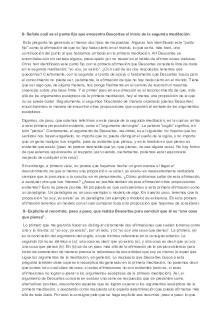Descartes Wax Paper PDF

| Title | Descartes Wax Paper |
|---|---|
| Author | Haley Leakey |
| Course | Modern Philosophy |
| Institution | Florida State University |
| Pages | 2 |
| File Size | 48.4 KB |
| File Type | |
| Total Downloads | 5 |
| Total Views | 162 |
Summary
paper...
Description
Haley Leakey PHH3400 Paper #1
Descartes Wax Argument
1. The argument that Descartes’ gives is that if you have a piece of wax and describe its properties as a,b, and c, and then melt this piece of wax which now has properties d, e, and f, you are still able to determine that this piece of wax is the same despite having different properties because one uses their pure intellect to determine what the wax is instead of using their senses or the imagination, because according the Descartes, the senses can not be trusted and if the senses can’t be trusted then neither can the imagination. The imagination makes up different things and ideas and according to Descartes, many of these are probably not real so therefore the imagination can’t be trusted to determine what is real or what the senses determine. Also, Descartes states that it couldn’t have the senses that determined this piece of wax was the same in both forms because the properties have changed from one form to another. Therefore, Descartes concludes that we know the wax by pure intellect alone.
2. An objection to this argument is that how can one determine what is a piece of wax without first knowing the properties it holds which requires the senses to know? You can’t determine what the wax is if you don’t know it’s properties, which is supplemented by the senses. Without our senses, you may be holding a piece of wax in your hand and not even know what it is as you can not see what color it is, what the texture is, what it smells like; it could be absolutely anything. Without the senses, there are no properties to attribute to this wax, and therefore no way to determine what the wax even is. You
have to be able to determine what a piece of wax is through the senses; you don’t know what a piece of wax is at a very young age because you possibly haven’t seen it’s shape or color or scent. Take an ice cube. I can’t touch this ice cube and determine this ice cube is a piece of wax, because the properties are not the same, and I would only know this if I had my senses to determine these properties. The senses have determined that the wax is something that has properties a, b, and c, and without these properties that the senses have determined, the wax is not a piece of wax. So, Descartes' argument doesn’t make sense because the senses are needed to determine what the wax even is, so the senses are the thing that is able to figure out what this wax is when it changes form, not just pure intellect.
3. My objection does hold a flaw in that it is hard to object to the notion that pure intellect is what is used to determine what the wax is AFTER the change in form. If we take senses out of the equation and therefore attribute no properties to the wax, we would know what this thing even is, but it is easy to determine that mind has made up what this thing is after it has been placed next to a figure and melted, our eyes have watched this piece of wax turn into a melted goop. We didn’t switch it out for something, we didn’t drop the wax, a chemical change did not take place, so therefore it is easy to determine that our mind is telling us this is the same wax because it has not left our hand or been added with anything and this doesn’t require the senses or the properties of the wax known to figure it out....
Similar Free PDFs

Descartes Wax Paper
- 2 Pages

Descartes wax argument
- 2 Pages

Descartes
- 1 Pages

Disertación Descartes
- 6 Pages

Descartes Redacción
- 3 Pages

Descartes 2020
- 10 Pages

Descartes - ffss
- 3 Pages

Comentario Descartes
- 1 Pages

Aristoteles, Descartes
- 2 Pages

Descartes - Meditationen
- 85 Pages

Descartes Erkenntnistheorie
- 26 Pages

Hausarbeit Descartes
- 14 Pages

Redacciones descartes
- 7 Pages

Argument of the Wax Analysis
- 3 Pages
Popular Institutions
- Tinajero National High School - Annex
- Politeknik Caltex Riau
- Yokohama City University
- SGT University
- University of Al-Qadisiyah
- Divine Word College of Vigan
- Techniek College Rotterdam
- Universidade de Santiago
- Universiti Teknologi MARA Cawangan Johor Kampus Pasir Gudang
- Poltekkes Kemenkes Yogyakarta
- Baguio City National High School
- Colegio san marcos
- preparatoria uno
- Centro de Bachillerato Tecnológico Industrial y de Servicios No. 107
- Dalian Maritime University
- Quang Trung Secondary School
- Colegio Tecnológico en Informática
- Corporación Regional de Educación Superior
- Grupo CEDVA
- Dar Al Uloom University
- Centro de Estudios Preuniversitarios de la Universidad Nacional de Ingeniería
- 上智大学
- Aakash International School, Nuna Majara
- San Felipe Neri Catholic School
- Kang Chiao International School - New Taipei City
- Misamis Occidental National High School
- Institución Educativa Escuela Normal Juan Ladrilleros
- Kolehiyo ng Pantukan
- Batanes State College
- Instituto Continental
- Sekolah Menengah Kejuruan Kesehatan Kaltara (Tarakan)
- Colegio de La Inmaculada Concepcion - Cebu

